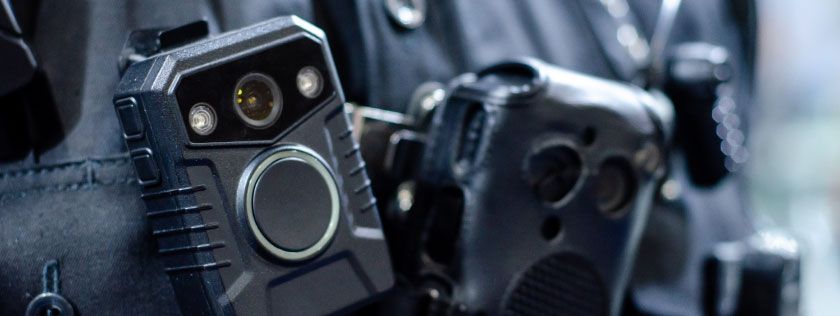Police bodycams – why rules around footage need to change

New research about police body cameras has revealed Police Scotland only stores video footage for 31 days.
Researchers from Stirling University, commissioned by Police Scotland, revealed the storage details following an investigation into a potential mass rollout of body worn videos (BWVs).
The report stated: “Police Scotland representatives confirmed: data is initially stored for 31 days and then destroyed. If the footage is used for court purposes then it would be deleted after a prosecution had been finalised.”
At Digby Brown we believe this 31-day period is a problem.
Generally speaking, the law makes clear that people have three years to make a personal injury claim (this also includes miscarriage of justice claims).
But if BWV footage is deleted after only one month where does that leave injured people who rely on such evidence as part of their case? And crucially – how does it help those injured people?
They deserve to have the time they need to focus on their recovery and process their emotions without worrying about how the police will (mis)manage video evidence of their case.
Our own data shows that for most people six weeks is typically the quickest people might consider making a claim – and in miscarriage of justice cases it’s frequently even longer.
Why are police bodycams used?
As the 74-page paper noted, there are many benefits – and challenges – when it comes to police officers wearing bodycams or BWVs.
The benefits include: improving transparency; improving accountability of officers; providing further evidence of callouts or attendances; reduce delays in justice system; and act as a deterrent to opportunistic offenders.
However the challenges can include: human rights violations and issues around permission of being filmed; dismantles public trust by exacerbating notions of a ‘Big Brother’ state; and even the increased costs to taxpayers.
Arguably, the general consensus – as noted by those who took part in the study – was that the use of BWVs was generally welcome.
But a vital and common sticking point related to one key issue:
What happens to police bodycam footage?
Just like Police Scotland, Northern Ireland officers delete BWV files after 31 days. Metropolitan Police uploads footage to a secure server at the end of each shift where it can be “used as evidence at court or other legal proceedings or deleted if it’s not needed”.
But this approach raises so many questions:
- Who decides when it’s “not needed”?
- How long do they wait before making this decision?
- Who can access the footage when it’s being stored?
- Who is notified of the storage and/or deletion of files?
- If footage is deleted, can it be retrieved?
- Can people request (unaltered) copies of the footage that relates to their incident under freedom of information or subject access request laws?
At Digby Brown we have helped thousands of people recover damages as a result of accidents that were not their fault.
Not only in road traffic accidents or accidents at work but even in miscarriage of justice cases where Police Scotland officers were held liable for harm or negligence felt by members of the public.
This is why we know how important BWV footage can be.
In the case of a road traffic accident an attending officer’s bodycam footage can shed light on the immediate aftermath of a collision which helps shed light on what actually happened – and therefore help people prove their cases and avoid a dispute of events.
While in the cases of complaints against police officers it can shed light on the conduct of officers during the incident in question – such as if they used excessive force, behaved threateningly or unreasonably to a compliant person or did not follow safe procedures while they have members of the public in their care.
Why bodycam footage matters to personal injury claims
Video evidence can massively help a personal injury claim as hundreds of people already know:
- cyclists with GoPros
- drivers with dashcam footage
- shoppers helped by CCTV footage
- even social media videos have proved useful
When it comes to police bodycams then it is important that such footage is stored and maintained thoroughly and responsibly.
Just because bodycam footage is not used in a criminal prosecution does not mean it is irrelevant.
Quite the opposite – it could actually prove to be vital in civil cases and help people secure damages and recognition they are entitled to (especially if it is their only way to do so).
Responsible data storage is seen in every organisation – a key example of this is a common policy to never delete workplace emails.
So why should Police Scotland’s BWV footage be any different?
We believe Police Scotland BWV footage should be stored for a minimum of three years – especially when the law gives people three years to raise a civil claim.
This way crucial evidence is not lost for potentially hundreds of Scots and access to civil justice is afforded the same level of consideration as that of criminal justice.
Read more about the Stirling University research into police bodycams.